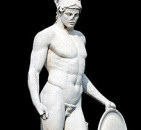Ares is the Greek god of war. He is one of the Twelve Olympians, and the son of Zeus and Hera. In Greek literature, he often represents the physical or violent and untamed aspect of war, in contrast to the armored Athena, whose functions as a goddess of intelligence include military strategy and generalship.
The Greeks were ambivalent toward Ares: although he embodied the physical valor necessary for success in war, he was a dangerous force, "overwhelming, insatiable in battle, destructive, and man-slaughtering." His sons Fear (Phobos) and Terror (Deimos) and his lover, or sister, Discord (Enyo) accompanied him on his war chariot. In the Iliad, his father Zeus tells him that he is the god most hateful to him. An association with Ares endows places and objects with a savage, dangerous, or militarized quality. His value as a war god is placed in doubt: during the Trojan War, Ares was on the losing side, while Athena, often depicted in Greek art as holding Nike (Victory) in her hand, favored the triumphant Greeks.
Ares plays a relatively limited role in Greek mythology as represented in literary narratives, though his numerous love affairs and abundant offspring are often alluded to. When Ares does appear in myths, he typically faces humiliation. He is well known as the lover of Aphrodite, the goddess of love, who was married to Hephaestus, god of craftsmanship. The most famous story related to Ares and Aphrodite shows them exposed to ridicule through the wronged husband's clever device.
The counterpart of Ares among the Roman gods is Mars, who as a father of the Roman people was given a more important and dignified place in ancient Roman religion as a guardian deity. During the Hellenization of Latin literature, the myths of Ares were reinterpreted by Roman writers under the name of Mars. Greek writers under Roman rule also recorded cult practices and beliefs pertaining to Mars under the name of Ares. Thus in the classical tradition of later Western art and literature, the mythology of the two figures becomes virtually indistinguishable.
- ส่วนหนึ่งของคำพูด: proper noun
- อุตสาหกรรม/ขอบเขต: History
- Category: Ancient Greece
ผู้สร้าง
- KSGRAM
- 100% positive feedback
(Athens, Greece)






